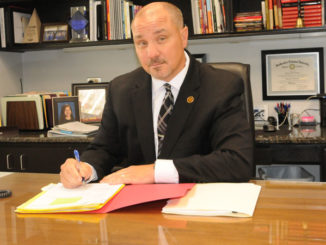
But will it continue?
BATON ROUGE – If you believe the economic development flacks, businesses inside Louisiana and around the country – world, even – continue to salivate at the thought of gobbling up some of the post-Katrina work here. Hurricane recovery can mean big dollars for corporate America and suddenly there’s something more lucrative than Mardi Gras in the Bayou State.
There are still contracts with the state and federal government to secure; displaced residents that need new homes; corporations that have to relocate; children that require schooling; environmental hazards that have to be cleaned; and the list goes on in quite a dreary sort of way, depending on your perspective of course.
In short, there’s a lot of work to do. The state knows this and has even taken to promoting the fact on an unprecedented scale. Ingenious inserts explaining what kinds of gigs are available, as well as their related incentives, are being placed in national publications like Business Week, Entrepreneur and Forbes. Ads have also been designed for the websites of CNN and The Economist.
Like a coupon for free money, the ads are working, according to state officials. After years of worrying about perception and restrictive laws, companies are beginning to regard Louisiana as a hot prospect – and we’re not just talking about Tabasco.
But once the rebuilding process begins to sizzle down, and Louisiana rides off into the sunset of recovery, will any of these companies still want to invest in Boudreaux and Marie and the kids? Once the tax breaks are gone, will the business stay?
Officials with Louisiana Economic Development argue that the wide variety of tax breaks and assistance programs are precisely why migrating companies will stay at bay. The business stimulants set the stage for a productive future, they say, and the state’s new “open for business” philosophy, in concert with long-term incentives beyond recovery, only bolsters the belief.
This amalgam is what has partly lured the Virginia-based Booz Allen Hamilton to south Louisiana this year. The strategy, management and technology consulting firm employs 17,000 people on six continents and generates roughly $3.6 billion in annual sales. To say the least, they’re not your average mom-and-pop outfit.
Unlike other companies wanting to cash in on debris removal or another physical job that residents pay for, Booz Allen is trying to drum up business directly with the state, said Bill McDade, a senior associate. An actual office in Baton Rouge, the hub of state government, is still in the works, but the company is already making its rounds to the Louisiana Recovery Authority, Louisiana Economic Development and the governor’s office.
Presently, Booz Allen has an office with 50 employees established in Metairie, which pulls in an estimated $6 million in revenues each year. This office is strictly dedicated to federal contracts, such as the one Booz Allen has with the Mineral Management Service to help streamline offshore drilling leases.
But the Baton Rouge office is where the company’s future could possibly reside, and it will be committed solely to state contract work.
“There is an incredible amount of money moving through the state right now,” McDade said. “A week after the hurricane hit, we started to do business development offsite and strategizing on our next step, and that major play was state work.”
The leap would have come sooner, he adds, but the company had always been slightly worried about age-old perceptions of the state and, frankly, threatened by certain contract laws. For instance, McDade points to an indemnity clause that Louisiana uses to wiggle out of paying vendors if they don’t like the work.
“When you look at the bottom line and get into large contracts, that can be a risky proposition,” McDade said, adding he has received commitments from the state to possibly work around that clause.
Additionally, the process of rebuilding has placed Louisiana in the national spotlight, he says, and that attention not only serves as a catalyst for corporate responsibility, but also keeps the state on its toes when approaching the work.
Donald M. Pierson, Jr., assistant secretary of Louisiana Economic Development, said this type of story has been told and retold countless times since last fall. Due to the hurricanes, there are companies that would have never considered Louisiana now working with the state.
While some worry the new businesses might be fly-by-night, meaning they could disappear as rebuilding ceases, Pierson claims there isn’t a concerned bone in his body.
“Some of these companies are traveling a long way, and they are nationally respected companies that haven’t been able to do large scale business with us before,” Pierson said. “But in this moment of history, we need all the engineering and technical expertise we can get to speed up recovery. They are welcomed and they will continue working with us.”
Pierson said LED has beefed up its outreach program and is keeping track of new businesses. More importantly, though, the department is making the companies aware of all the incentives available to the state, like Community Block Grant funding and the almighty Gulf Opportunity Zone Act, which provides tax-free borrowing, a slew of write-offs, depreciations and much more.
There are 31 parishes eligible to participate in the gulf zone program and Pierson said companies are targeting them with a vengeance.
“I think we’re going to continue to see a vast number of major U.S. corporations demonstrating a new or renewed interest in doing business with the state,” he said. “All of these incentives will help companies that want to make a major investment in Louisiana to put themselves in a favorable position to take advantage of the market.”
Anticipation of this declaration was building earlier this month as U.S. Commerce Secretary Carlos M. Gutierrez, along with Donald Powell, the federal coordinator for Gulf Coast Rebuilding, visited Baton Rouge and New Orleans as part of a major investment mission.
“This is really great,” Pierson said. “I mean, when you hear about an economic mission, it’s usually to another country or something, but the focus is on Louisiana.”
A delegation of 37 companies attended the mission, including major Fortune 500 companies and small-sized enterprises. In addition to promoting the incentives, Pierson says an effort was placed on ports, transportation infrastructure and natural resources.
McDade agreed that the momentum continues to build and he’s glad Booz Allen is coming in relatively early. As for whether all of the new companies flocking to the state stay or go, he said it would be an unwise business decision to leave the market in the near future.
But, more importantly, corporate responsibility should dictate a company toughing it out in a situation like this, he added.
“We’re focused on expanding in southeast Louisiana and are dedicated from a personal standpoint,” McDade said. “Our employees and partners live in Louisiana and we want to see both flourish once again.”





Be the first to comment